Students from the minority bracket blame poor career consultancy in their university for their struggles in finding a job.
Career consultancy programs
Reports show that the number of clients career consultancy offices take is mostly from the minority group composed of Black, Asian, and other minority ethnicities. Experts suppose that their respective universities haven’t provided effective training in career development that these students opted to seek private help.
One black student mentioned that university assigned to him a white career advisor, very contrary since his advisor probably can’t relate to his possible struggle in applying for work because of their ethnicity gap.
How can he relate to my life experience as a black male? How can he fill in my shoes when it comes to applying for jobs? Calibrate the level of assertiveness and demeanor that I have to show during interviews?
There is a strong feeling of prejudgement when it comes to the type of jobs or industry that they can apply for. One student described his session with the university career consultancy program as discouraging.
It was as if he was directing my options to less prominent jobs and constantly reminding me to be more “realistic.”
Students feel disconnected
Students from the minority are unable to express themselves and ask for personal advice when the adviser in charge of them is either white or from a different ethnicity. Simple things like the hairstyle upon interview can cause an impact on applicants, especially those belonging to the Black, Asian, and Minority Ethnicity (BAME) group.
Study shows that BAME students graduate from universities with less confidence, limited knowledge in applying for work, and handling job interviews.
Black male graduates earn 17 percent lower compared to white male graduates, while black female graduates earn nine percent lower compared to white female graduates.
Career consultancy programs in universities must provide training for different specific communities. Diversity is common in all universities, which is why they should be able to address the diverse pool of students on their campuses.
If universities can also show their capacity to produce and employ BAME students into successful careers, it will soon translate to a higher number of enrollees from the BAME community.
Featured image by BritishBindi







